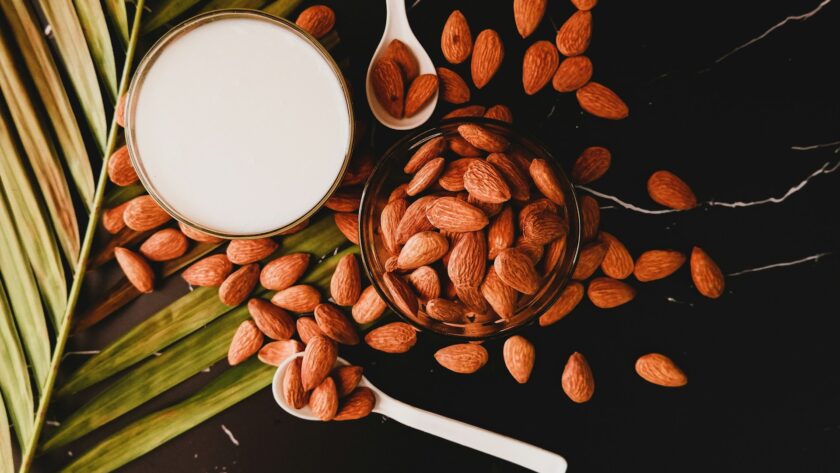In the realm of nutrition folklore, the supposed symbiosis between almond milk and testosterone reigns as a captivating narrative. Amidst the clinking of glasses and the whirring of blenders, health aficionados fervently seek the elixir of vitality, believing almond milk to hold the key to elevated testosterone levels. But amidst this fervor, a crucial question emerges: does this union between milk and testosterone truly stand the test of scientific scrutiny? Let’s embark on a journey through the labyrinth of nutritional science to unravel the enigmatic relationship between almond milk and testosterone.
Does Almond Milk Boost Testosterone?
Amidst the whispers of health fads and the clinking of almond milk cartons, a captivating question echoes through the corridors of nutrition discourse: does almond milk truly possess the power to elevate testosterone levels? Imagine, if you will, the scene: a bustling kitchen, where health enthusiasts fervently pour creamy almond milk into their morning smoothies, all in pursuit of a coveted boost in vitality and vigor. It’s a tantalizing notion, one that has permeated the collective consciousness with the promise of newfound virility.
But let’s delve deeper into the heart of this nutritional enigma. Testosterone, often hailed as the quintessential hormone of masculinity, plays a pivotal role in a myriad of physiological processes, from muscle growth to libido. Naturally, the prospect of enhancing testosterone levels through the consumption of a humble nut-based beverage holds undeniable allure. Yet, as with any enticing tale, the truth may not be as straightforward as it seems.
Despite the fervent assertions of almond milk enthusiasts, the verdict from the laboratory remains inconclusive. While almond milk does boast an impressive array of nutrients, including vitamin E, calcium, and protein, its purported ability to directly influence testosterone levels remains a subject of debate.
Indeed, studies exploring the relationship between almond milk consumption and testosterone production have yielded mixed results. Some suggest a potential link, citing the presence of certain compounds that may indirectly support hormone balance. Others, however, fail to observe any significant impact on testosterone levels, casting doubt on the veracity of the almond milk testosterone-boosting myth.
So where does this leave us in our quest for nutritional enlightenment? As with any complex scientific inquiry, the answer lies not in sweeping proclamations or grandiose claims, but in the nuanced interplay of multiple factors. While almond milk may offer a host of health benefits, from its lactose-free composition to its rich antioxidant content, its ability to single-handedly elevate testosterone levels remains unsubstantiated by concrete evidence.
In the ever-evolving landscape of nutrition science, it’s essential to approach such claims with a healthy dose of skepticism. Rather than placing undue faith in the latest dietary trend, let us instead turn our focus to balanced, evidence-based nutrition, grounded in the principles of moderation and variety. After all, when it comes to nourishing our bodies and minds, there are no quick fixes or miracle elixirs—only the steady pursuit of informed choices and holistic well-being.
Nutritional Profile of Almond Milk
At its core, almond milk boasts an impressive array of vitamins, minerals, and antioxidants. Vitamin E takes center stage, serving as a stalwart defender against oxidative stress and supporting skin health. Meanwhile, calcium fortifies bones and teeth, promoting skeletal strength and muscular function. Additionally, almond milk provides a notable source of protein, essential for tissue repair and muscle development.
Despite its nutritional prowess, almond milk’s purported ability to influence hormone levels, particularly testosterone, remains a topic of debate. While some suggest its nutrient-rich composition may indirectly support hormone balance, concrete evidence linking almond milk consumption to testosterone elevation is lacking. Nonetheless, its lactose-free nature and nutrient density make it a valuable addition to a balanced diet, particularly for those with dietary restrictions or seeking alternatives to dairy.
Almond milk stands as a testament to the intersection of nature’s bounty and nutritional science. Its creamy texture and rich flavor offer a versatile canvas for culinary exploration, while its nutritional profile provides a robust foundation for overall health and wellness. Whether enjoyed in a morning latte or blended into a post-workout smoothie, almond milk embodies the essence of nourishment, offering a glimpse into the boundless possibilities of plant-based nutrition.
Scientific Studies and Evidence
Embarking on a journey through the annals of scientific research, we delve into the realm of studies probing the elusive connection between almond milk consumption and testosterone levels. Researchers, armed with curiosity and methodological rigor, have sought to unravel the mysteries lurking within each almond-laden sip. Their investigations span laboratory experiments, clinical trials, and population studies, each endeavoring to shed light on this enigmatic relationship.
As we sift through the data, patterns emerge, revealing a tapestry of findings both intriguing and complex. Some studies suggest a potential link between almond milk consumption and testosterone modulation, citing the presence of bioactive compounds such as vitamin E and zinc, known for their roles in hormone regulation. These findings hint at the possibility of an indirect influence on testosterone levels, mediated by the intricate interplay of nutrients within almond milk.
However, amidst these promising glimpses, a veil of uncertainty shrouds the landscape. Other studies fail to corroborate these observations, reporting no significant impact of almond milk consumption on testosterone levels. Despite meticulous methodologies and rigorous analyses, the evidence remains inconclusive, leaving researchers grappling with unanswered questions and conflicting conclusions.
In the face of such ambiguity, one thing becomes abundantly clear: the need for further investigation. As science marches forward, fueled by curiosity and the quest for truth, researchers continue to probe the depths of this intriguing relationship. Through collaborative efforts and interdisciplinary inquiry, we inch ever closer to unraveling the mysteries of almond milk’s potential impact on testosterone levels.
Yet, amidst the uncertainty, one thing remains certain: the importance of evidence-based decision-making. While almond milk may offer a host of nutritional benefits, from its rich antioxidant content to its lactose-free nature, its alleged influence on testosterone levels warrants cautious consideration. As we navigate the complexities of dietary choices and their potential impacts on health, let us remain vigilant, guided by the guiding light of scientific inquiry and the pursuit of truth.





